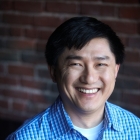You can read it here on the Times site, but you need a subscription. Here's the text posted on AngryAsianMan.com.
His column is all anecdotal. He interviews one Asian American kid, and kind of just concludes that it's something in the culture passed down from the collective Confucian history of those from East Asia (China, Japan, Korea and Vietnam). He ignores South Asians and the fact that many Southeast Asian Americans don't fall into the "model minority" stereotype of being smart, high achievers who all go to Berkeley and Harvard.
This is such a broad and complicated subject full of landmines that I don't know why he would try to tackle it in the limited space of a newspaper column. Whole books are written about this and there is still no real answer, and maybe there doesn't have to be. Why is there so much obsession over this subject?







Comments